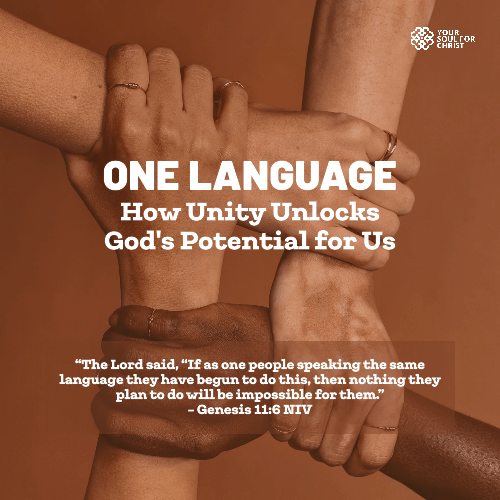AND THE whole earth was of one language and of one accent and mode of expression. And they said, Come, let us build us a city and a tower whose top reaches into the sky, and let us make a name for ourselves, lest we be scattered over the whole earth. And the Lord came down to see the city and the tower which the sons of men had built. And the Lord said, Behold, they are one people and they have all one language; and this is only the beginning of what they will do, and now nothing they have imagined they can do will be impossible for them.
Genesis 11:1, 4-6 AMPC
The Bible describes a time when all people on earth shared one language and one mode of expression. While we don’t know how many people there were, the key takeaway is that they could communicate without misunderstandings. Therefore, they could work together effectively. This perfect understanding among them highlights the power of one language and unity in purpose. This remains a timeless lesson for us today in our marriages, churches, and communities. When people share a common understanding, they can move together towards a common goal.
In Genesis 11, we see the people agreeing to build a city and a tower reaching into the heavens. This plan reveals an important truth about humanity: even though sin separated us from God, we still carry the intellectual capacity He gave us. Despite our fallen nature, we retain the creativity, innovation, and problem-solving abilities instilled in us by our Creator. However, without divine guidance, our thoughts and ambitions can often stray into self-centered or destructive directions, just as the people at Babel chose to elevate their name instead of seeking God’s will.
Their unity enabled them to create bricks, establish a city, and begin building an unprecedented tower. Reflecting on this, I find myself asking: “Am I using my God-given talents for His purpose? How am I applying the wisdom and abilities He’s placed in me to benefit others?”
It’s an important question, especially in a world where technology shapes our lives. We must seek God’s direction, asking, “Lord, what do You want to accomplish through me?”
In Genesis 11:6, God acknowledges the power of their unity, saying, “They are one people, and they have all one language, and this is only the beginning of what they will do. Nothing they have imagined they can do will be impossible for them.” This statement underscores how vital unity in language and purpose is to achieving the seemingly impossible. Consider a husband and wife who don’t share the same “language” or way of expressing themselves—it can take ages to reach an agreement. But when they are on the same page, their joint vision becomes achievable.
God’s words affirm that people can accomplish great things—even unprecedented achievements—when united in language and purpose. Imagine applying this unity to godly goals rather than to selfish or harmful ambitions. Just as wicked plans can succeed when backed by unity, how much more can we accomplish when we align with God’s will and work together?
So why not aim for unity in our families and churches? Why shouldn’t our marriages and our congregations become places where we communicate with one voice, united in purpose and vision? The Church will only reach its full potential when its members share one language. When we have language of understanding, compassion, and shared goals. Our marriages, too, will thrive when couples understand each other. When they speak each other’s “language,” and pursue the same vision for their lives together.
In conclusion, Genesis 11 teaches us that unity in language, accent, and mode of expression is a powerful tool for achieving any goal. When people are united, they can break barriers, overcome challenges, and innovate in ways that were previously unthinkable. Whether in our families, our churches, or our workplaces, let us strive to be people who speak one language—a language of love, faith, and shared purpose. When we achieve this unity, the possibilities are limitless, for “nothing we imagine will be impossible.
